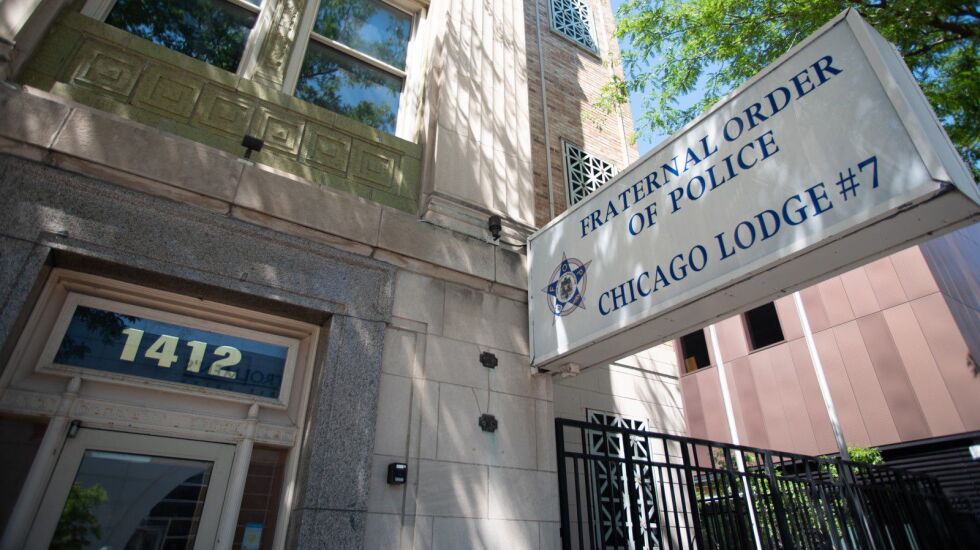
Since winning control of the main union for Chicago cops and retirees nearly three years ago, Fraternal Order of Police Chicago Lodge 7 President John Catanzara Jr. has waved off criticism about the lack of diversity among his union’s elected leaders.
As part of his reelection campaign, though, he assembled a relatively diverse slate of candidates for the union’s board of directors. The slate included nine Latinos, three African Americans and four women.
“This is the most diverse opportunity for representation the membership has ever been presented,” Catanzara said in a campaign video last month, touting the slate as a “perfect example of where we are trying to take this lodge so, in future administrations, the board of directors looks a lot less like me and a lot more like roll-call rooms, like it should have for quite some time now.”
In the election, which ended March 3, his slate swept the board’s top seven seats and won 11 of the other 20 races. But there was a problem: The 7,250 lodge members who voted rejected most candidates who were not white men, according to a WBEZ analysis of union and CPD records about the candidates.
The board’s 27 elected members will include six Latinos but just one woman and one African American. The dearth of Black board members may be especially troublesome as a gun violence surge hits Black neighborhoods hardest.
The sole Black board member will be Keith Carter, a retired detective who ran for trustee on a slate that opposed Catanzara.
“Inclusion is my thing,” Carter said. “It doesn’t matter what color you are. It’s about helping the members out.”
Carter is the first African American elected to the board since Sidney M. Davis, an evidence technician who won reelection as recording secretary in 2011. Since 2014, Black members have made at least 27 unsuccessful runs for the board, the WBEZ analysis found.
Carter credited his victory to his union involvement since 1994, when he agreed to represent his co-workers as a “watch representative” in a West Side patrol district known in those years as Monroe. A larger group of co-workers later elected him as their unit representative.
But Carter lost three subsequent races for the union’s board — once as part of a slate, the other times running independently.
The late Dean Angelo Sr., who was lodge president from 2014 to 2017, appointed Carter a field representative, a full-time union post that elevated his profile among cops.
“Name recognition might have helped me get elected,” Carter said, referring to his March 3 victory.
Some Black cops say underrepresentation on the board owes to low levels of African American activity in the lodge.
“If you’re not participating and voting, Black candidates won’t get voted in,” said Donnell Crenshaw, a South Side homicide detective who ran unsuccessfully for trustee seats in both 2020 and 2023.
Other African American cops say the union turns off many Black officers by backing right-wing politicians, including Donald Trump, and allegedly providing substandard legal representation to Black officers who face discipline. An African American who won a 2002 trustee race speculated that she lost subsequent lodge elections because too many white officers discovered she was Black.
Crenshaw said he considered running for trustee as part of Catanzara’s slate, but it already had too many candidates. The slate pushed 20 candidates for 17 trustee seats, a tactic that may have diluted support for the slate’s Black members.
“That’s my only gripe with Catanzara,” Crenshaw said. “He had so many people running for trustee.”
Following the path of several previous presidents, Catanzara pledged to appoint a Black candidate on his slate to serve as a field representative even if that person lost the election. In a video, he said that representative would be longtime patrol officer Kenyatta Gaines.
Catanzara did not respond to questions about the board’s lack of diversity or his decision to run the 20 trustee candidates for the 17 seats.
Whites make up 43.4% of the Chicago Police Department’s sworn officers, according to city figures released this month by the Inspector General’s Office. But the number of white officers has been declining for decades. Latinos now account for 31.9% of the force, a number that has increased over the years. African Americans make up 20%, a share that has held steady for about a year after more than a decade of shrinkage. Asians make up 3.4%.







